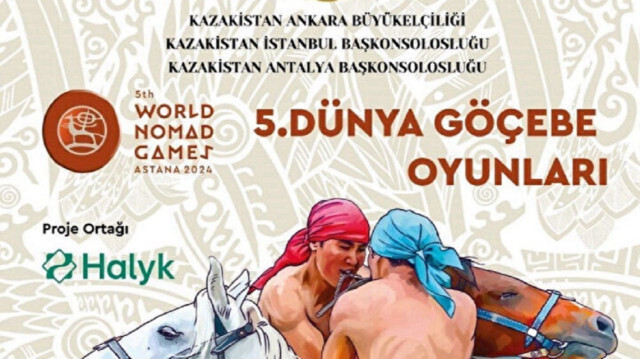
As the summer sun begins to set and the autumn breeze sweeps across the Kazakh steppes, Astana will come alive with the spirit of our nomadic ancestors, hosting the Fifth World Nomad Games from September 8-13.
Preserving cultural heritage is known to be crucial in shaping a nation's identity and determining its future. Countries around the world have safeguarded historical sites, languages, and natural areas. In Central Asia, where the region's rich and diverse history dates back to the 3rd millennium BCE, the preservation of cultural heritage is equally important.
As the summer sun begins to set and the autumn breeze sweeps across the Kazakh steppes, Astana will come alive with the spirit of our nomadic ancestors, hosting the Fifth World Nomad Games from September 8-13. This event will transform our vibrant capital into a bustling arena of culture, competition, and camaraderie. I am thrilled to extend a heartfelt invitation to the Republic of Türkiye to join us in celebrating this grand event.
The importance of these Games to us is akin to the significance of the Olympics for the world. They are a testament to the resilience, creativity, and traditions of nomadic cultures. For the world, it is an opportunity to learn about and celebrate the culture and history of nomadic peoples, offering a unique window into the heritage that shapes our identity and continues to influence our way of life.
The Fifth World Nomad Games, first held in Kazakhstan in 2014, will bring together over 2,500 participants from nearly 100 countries. As a country experienced in hosting major global events, Kazakhstan eagerly anticipates welcoming over 100,000 local and international tourists to celebrate our culture and foster international friendship.
A significant aspect of the World Nomad Games is the preservation of ancient sports and cultural practices. The culture of nomadic peoples has not yet gained widespread popularity globally. These games will change that by allowing visitors to witness rare sports and immerse themselves in our traditions. In Astana, 21 types of sports will be showcased, including horse racing, traditional intellectual games, martial arts competitions, national bird hunting, and other folk games.
One of the most anticipated events is Kokpar, an exhilarating and dynamic sport similar to polo but with a distinct nomadic touch. Teams on horseback compete for control of a goat carcass, demonstrating exceptional skill, strength, and strategy. This sport, along with many others featured in the Games, highlights the significant role horses have played in our culture. They were indispensable companions in daily life, including migration, warfare, hunting, and trade. The Kazakh people take pride in the domestication of horses, which first occurred approximately 5,500 years ago in what is now modern Kazakhstan. In fact, horses are considered one of the seven sacred treasures of the Kazakh people. This long-standing bond between Kazakhs and horses will be vividly brought to life through the equestrian events at the Games.
In addition to Kokpar, spectators will witness traditional sports such as archery, wrestling, and eagle hunting. Each sport holds its own historical significance, showcasing the diverse skills our ancestors developed to thrive in the vast and challenging landscapes of Central Asia.
Moreover, daily cultural activities will take place in the unique "Ethno-village," where the past and future, tradition and modernity, harmoniously meet. Here, visitors will marvel at the largest exhibition fair of Kazakh craftsmanship, where master artisans will display their works and share the secrets of their crafts through engaging master classes.
One of the highlights of the cultural program is Aitys, a traditional music competition of akyns (Kazakh folk poets and singers). This poetic duel, where leading and emerging aitysker (Aitys participants) showcase their wit and lyrical talent, continues to captivate audiences with its blend of creativity and competitive spirit. Meanwhile, the ethnic fashion festival will delight fashion enthusiasts with showcases of ethnic attire.
The national cuisine festival promises a feast, offering master classes where visitors can learn to prepare traditional Kazakh dishes and beverages, experiencing firsthand the famed hospitality and warmth of the Kazakh people.
This September's World Nomad Games promises to be an unforgettable experience, blending the excitement of competition with the richness of cultural heritage. The event offers a chance to strengthen cultural ties between nations. As a country that hosts over 100 ethnicities and values interethnic harmony, we warmly welcome people from all over the world to Astana, where the nomadic spirit lives on. Let us celebrate history, culture, and sports, and be part of an event that honors our shared human heritage!
Ambassador of Kazakhstan to Ankara
Yerkebulan Sapiyev

